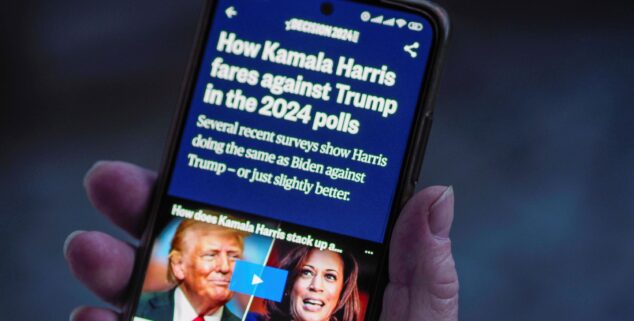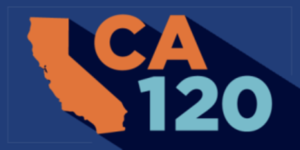Analysis
CA120: Pour one out for the pollsters
 Image by Associated Press
Image by Associated PressOver the past three weeks the presidential election has been in more chaos than ever in my lifetime. We had what was objectively the worst presidential debate performance in US history, followed by a presidential assassination attempt, then a Republican convention and naming of the Republican Vice Presidential candidate, followed by the Democratic presumptive nominee, and sitting president, dropping out.
More than once I’ve heard my pollster clients exclaim, “well, I guess we have to go back out into the field” as the ground seemed to shift under their feet.
And I have joined them.
 Two weeks ago, we thought it would be good to do a Capitol Weekly poll to identify the support for both President Biden and Vice President Harris in a race against Trump in California, and then dig deeper into their favorable numbers after the debate, and gauge the interest in Biden potentially dropping out of the race.
Two weeks ago, we thought it would be good to do a Capitol Weekly poll to identify the support for both President Biden and Vice President Harris in a race against Trump in California, and then dig deeper into their favorable numbers after the debate, and gauge the interest in Biden potentially dropping out of the race.
That first poll was all done and weighted and ready to be released. We even did a podcast on the findings. But then the assassination attempt made it seem irrelevant, so we shelved it.
Since we had that one poll, we decided the following week to redo the poll, hoping to use the first as a baseline find out the impact of the assassination attempt and the Republican National Convention, expecting to see some kind of polling bounce for Trump. That poll was completed and weighted over the weekend, only to have Biden announce at 1:46pm on Sunday that he was dropping out of the presidential contest, then, shortly thereafter, announcing his support for Harris as his replacement.
But, this time, we are releasing the poll, with the caveat that many of the findings will be overwhelmed by the recent change in the presidential contest, and only parts of the polling have real relevance to the contest that we now have before us.
There are some findings here which support the decision by President Biden to drop out of the race. We found a major underperformance when compared to his 2020 victory over Trump. Where in 2020 Biden won by nearly 30-points, his statewide polling margin had slipped to just 18-points.
Presidential Contest Toplines – Biden v. Trump
| 7/12-7/14 n=1,044 |
7/19-7/22 n=2,121 |
Change | |
| Biden | 51 | 52 | +1 |
| Trump | 33 | 35 | +2 |
| Kennedy | 6 | 6 | – |
| Stein | 5 | 4 | -1 |
| De La Cruz | 4 | 3 | -1 |
Presidential Contest Toplines – Harris v. Trump
| 7/12-7/14 n=1,044 |
7/19-7/22 n=2,121 |
Change | |
| Harris | 54 | 54 | – |
| Trump | 35 | 33 | -2 |
| Kennedy | 7 | 7 | – |
| Stein | 3 | 4 | +1 |
| De La Cruz | 2 | 2 | – |
Underlying these numbers were some significant deficiencies among key Democratic subgroups, particularly younger voters and Latinos. In the first survey, Biden’s lead among young voters, aged 18-34, was at 21-pts, but by the second survey it had slipped to just 14-pts. Among Latinos he had only a 7-point lead over Trump in the first survey, and a 8-pt lead in the second. These kind of numbers in California, a state that is a lock for the Democrats, could translate to being behind in other states that are the real battlegrounds.
Potentially even more problematic for Democrats than the lower Biden performance was the reduced enthusiasm for voting in November expressed by key demographic groups. When asked “Would you be more likely to turnout for the presidential election if Joe Biden drops out of the race and the Democratic Party nominates a younger candidate at their upcoming national convention?” 49% of Democrats, 61% of voters aged 18-34, and a whopping 75% of 18-34 year-old Democrats, said they would be more likely to vote.
This expression of greater interest in voting if Democrats changed to a younger nominee is not a finding that should be taken literally – it is not like 75% more young Democrats will turn out to vote because of this change. But, it suggests that about half of Democrats and three-quarters of younger Democrats will be more enthusiastic. And enthusiasm drives turnout and wins elections.
On the decision to drop out of the race, 56% of Democratic voters thought Biden should drop out, with 68% of all voters citing his age and mental acuity rather than his policies or some other reason. By the time of the second survey this had grown to 63% of Democrats who believed the Democratic Party should have a different nominee.
The process for selecting a nominee during the time of this survey was a clear point of contention – with Biden and his supporters, even Republicans who wanted him to stay in the race – citing the 14 million voters who had cast ballots in the primary, and how undemocratic it would be for the party to change candidates at the 11th hour. However, when asked about a potential replacement at the convention, 85% of Democrats and 84% of voters who said they supported Biden, considered it a legitimate process.
Among potential candidates to replace Biden on the ticket, the far-and-away favorite was Kamala Harris as the choice of 34% of voters, 39% of Democrats, followed by Governor Gavin Newsom at 14% of voters and 17% of Democrats. Other candidates that ranked included Governor Gretchen Whitmer, Secretary Pete Buttigieg, Senator Elizabeth Warren, Senator Amy Klobuchar, and other prominent US Senators and Governors, all of whom were in single-digits.
The full crosstabs of these two polls have been weighted to the Political Data likely voter universes for the November General election and can be found here and here. There are several other questions asked, including favorability of state and national elected officials, how important different endorsers are to voters this election cycle, and more.
Paul Mitchell is Vice President of Political Data Inc, a bipartisan voter data firm based in California, and owner of Redistricting Partners.
Want to see more stories like this? Sign up for The Roundup, the free daily newsletter about California politics from the editors of Capitol Weekly. Stay up to date on the news you need to know.
Sign up below, then look for a confirmation email in your inbox.

Leave a Reply